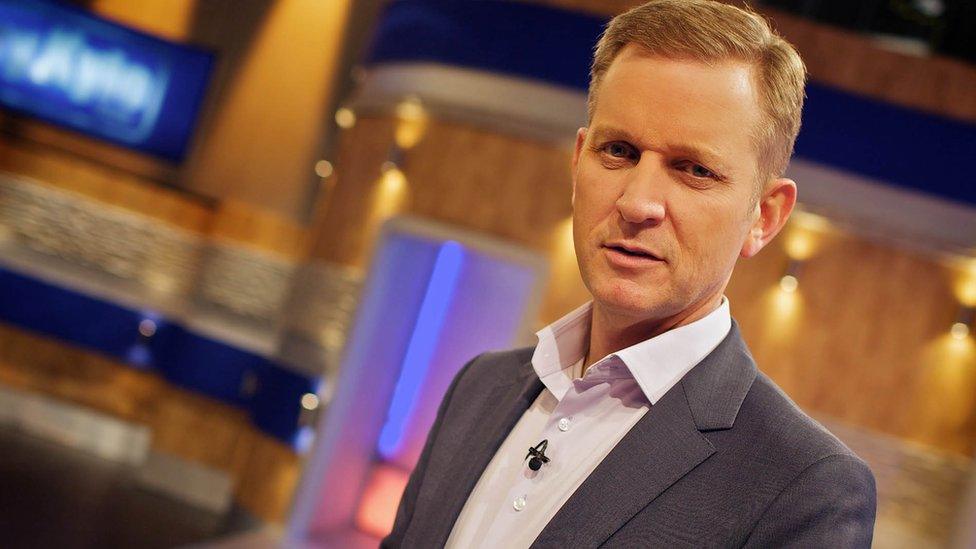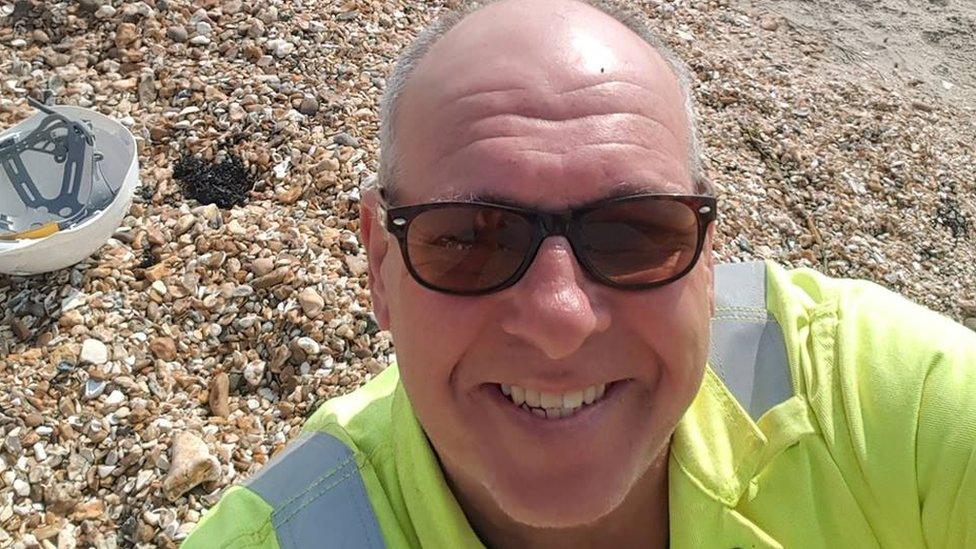Why The Jeremy Kyle Show was scrapped
- Published
The precise circumstances of Steve Dymond's death are not known. But what is clear, from multiple sources, is that he was troubled and vulnerable before he participated in the show - even though he did so willingly - and that failing the lie detector test was a devastating blow.
That much was clear on Tuesday morning, when ITV said that they were minded to launch an inquiry and wait for the coroner's verdict. Yet this morning the show was taken off the air permanently.
What happened that should cause the sudden change of mind?

The Jeremy Kyle show has been part of ITV's daytime schedule since it started in 2005
Two things at least. First, growing evidence of links between that failed lie detector test and Mr Dymond's death. ITV learned significant new information in the past 24 hours. And second, another morning of damaging front page headlines, especially in the tabloids that are still influential and widely read among ITV's heartland audience.
That is explicitly not to say that the decision to take the show off air permanently was primarily a commercial one. The driver may have been moral repugnance, at ITV board level, at what has happened. Certainly, if as part of their internal process board members saw footage of Mr Dymond's response to failing the lie detector test on the episode that was never aired, it must have prompted a visceral reaction.
Consider the audience
But even if you accept that Carolyn McCall and the ITV board made this decision because of revulsion at what one of their shows did, that doesn't discount the commercial and editorial context in which the decision was made.
As an advertiser-funded broadcaster, albeit with multiple linear channels and a digital offering, ITV is under pressure. Kevin Lygo, its creative chief, has tried to reinvent the schedule, and with some success. But the feeling at the top of ITV is that Jeremy Kyle's show was a distinct anomaly within the new offering - and therefore not necessarily a good fit as part of its future. It is hard to imagine that the show would have been permanently scrapped if Lygo and other bosses were deeply admiring of it.
In reaching millions of people every weekday, many of them of the view that the mainstream media doesn't generally reflect their lives very well, ITV had a solid, regular offer to a big and loyal audience. In today's exceptionally competitive media environment, when the claims on our attention are multiplying by the minute, that isn't something you give up lightly. Especially when you know that whatever replaces Kyle will struggle to achieve its ratings, at least at first.
There is, as I mentioned on last night's bulletins, a massive disconnect here: between those who wanted the show off air, who generally don't watch it; and those who do watch it, and feel they can relate to it.
These fans, like ITV bosses, might proffer a liberal argument: people who go on the show are consenting, fully informed, capacitous adults who know what they're doing. In the show's 14-year history, thousands of contributors have been on-stage. And this is not a show that has traditionally led to Ofcom being inundated with complaints.
The new exhibitionism
Several people have said to me that, given two people who appeared on Love Island have taken their own lives, it is inconsistent to leave that show on air, and ITV's decision on Wednesday is partly about protecting that highly lucrative show.
ITV resist the latter point strongly, and it is important not to generalise from the specific circumstances of any death - particularly suicide. Moreover, Love Island and The Jeremy Kyle Show occupied very different parts of the schedule, and don't belong in the same category of programme.

Steve Dymond, who was 63, was found dead a week after he was filmed on the Jeremy Kyle show taking a lie detector test to prove if he'd been faithful to his fiancee
I wonder, however, if rising concerns about the mental health of participants in all TV programmes may prompt greater investment in after-care, or an expansion of Ofcom's remit to go much further on the duty of care programme makers have toward their contributors.
Celebrity culture is as old as culture itself; but the advent of, first, mass media, and now social media, has rapidly expanded the circle of those who can be famous. But displaying, or even parading, private anguish and trauma in a public way can obviously have a disastrous impact on mental health.
Whether it be Strictly Come Dancing, Come Dine With Me, or The Jeremy Kyle Show and Love Island, contributors and contestants give up something of themselves, some degree of autonomy, when they become characters in productions whose goal is commercially motivated entertainment. The journey they go on, and which viewers are encouraged to go on with them, can be life-affirming, cultural gold-dust. That is television at its best.
But the spectacle can also lead contributors to a dark place. Even if that is not television at its worst, it is television that - for now - ITV believes should not be aired. No matter the ratings.
If you're interested in issues such as these, you can follow me on Twitter, external or Facebook, external; and subscribe to The Media Show podcast from BBC Radio 4.
